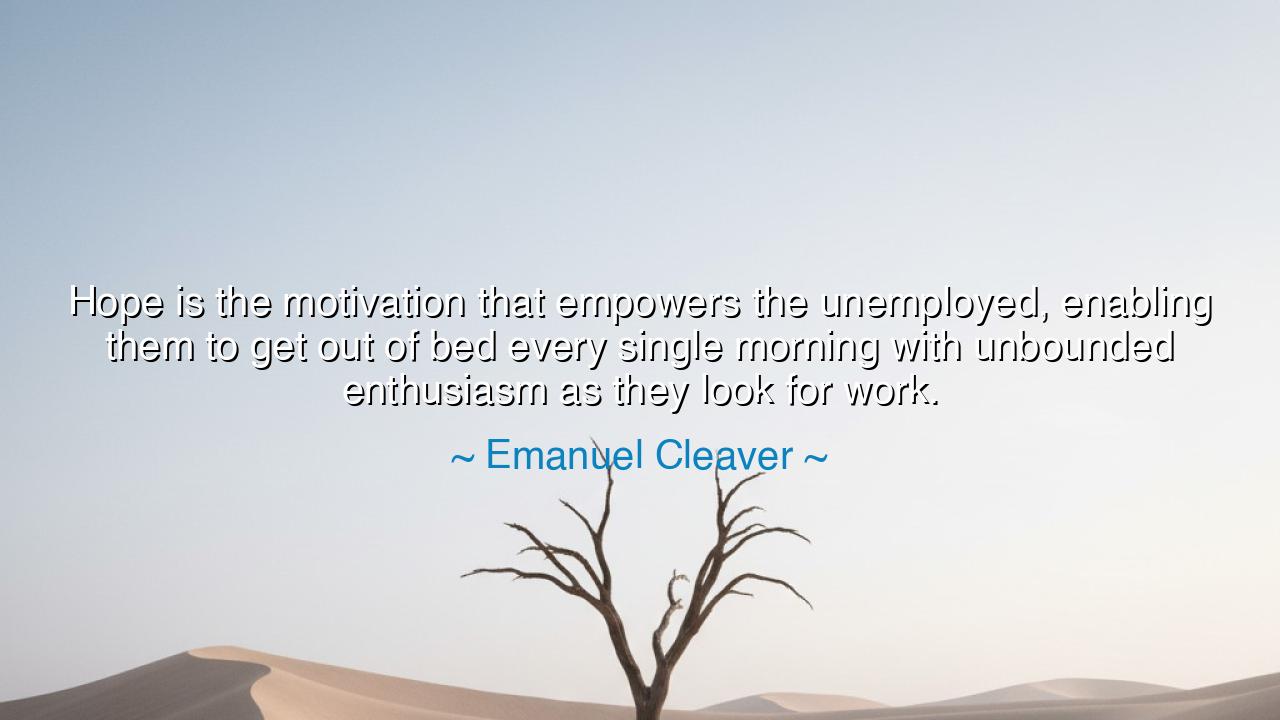
Hope is the motivation that empowers the unemployed, enabling
Hope is the motivation that empowers the unemployed, enabling them to get out of bed every single morning with unbounded enthusiasm as they look for work.






Hear the stirring words of Emanuel Cleaver, who once declared: “Hope is the motivation that empowers the unemployed, enabling them to get out of bed every single morning with unbounded enthusiasm as they look for work.” In this saying lies a truth as old as humanity itself—that when all else is taken away, when wealth and position vanish, when the world seems deaf to one’s pleas, it is hope that remains as the last, and greatest, source of strength.
The unemployed, stripped of security and cast into uncertainty, often dwell in a valley of trial. Their bodies may be weary from rejection, their spirits heavy with doubt. Yet, Cleaver reminds us, they rise each morning, not because their path is easy, but because hope whispers that tomorrow may yet be different. This invisible power is stronger than gold, stronger than reputation, for it keeps alive the flame that drives a person to seek, to strive, to believe that dignity and purpose can still be found.
The ancients too revered the sacred force of hope. In the myth of Pandora, when all the plagues and sorrows of the world were loosed from the jar, only hope remained within. The gods, in their wisdom, decreed that even amid suffering, mankind would never be utterly abandoned. So long as a person carries hope, despair can never fully conquer. Cleaver’s words are but a modern echo of that ancient tale, showing how even those cast down by fortune can still rise.
History too bears witness. During the Great Depression of the 1930s, millions of men and women lined the streets in search of work, their pockets empty, their families hungry. What lifted them from their beds each day? Not certainty, not wealth, but the unyielding strength of hope—that perhaps the next door knocked upon, the next employer spoken to, might offer a chance. And many, through persistence fueled by hope, did find their way again.
Even in personal lives, this power is clear. Consider Nelson Mandela, who endured 27 years of imprisonment. Though not “unemployed” in the usual sense, he was cut off from the world, deprived of freedom and opportunity. Yet it was hope—the vision of a free South Africa—that enabled him to rise each day, to endure the monotony of captivity, to keep his heart unbroken until history itself opened its doors. Without hope, he would have withered. With it, he changed the destiny of a nation.
The lesson, O listener, is this: never underestimate the force of hope. When life has stripped away comforts, when rejection comes again and again, when the future seems uncertain, cling to this one power. Let it be your motivation. Rise with it each morning. Let it push you forward, for each step taken in hope brings you closer to the turning of fortune’s wheel.
Therefore, if you yourself walk through days of uncertainty, follow Cleaver’s wisdom. Do not remain in despair, chained to your bed. Instead, let hope drive you into action. Seek diligently, strive constantly, and guard your spirit against bitterness. And if you encounter another who struggles, offer them not pity alone, but the gift of encouragement, that their hope might remain unbroken.
So remember: hope is not a fragile dream, but the very engine of survival. It is what empowers the weary to stand, the discouraged to strive, and the broken to believe again. Carry it in your own heart, kindle it in the hearts of others, and you will find that even in the darkest seasons, the soul can still awaken each day with enthusiasm for what is yet to come.






AAdministratorAdministrator
Welcome, honored guests. Please leave a comment, we will respond soon